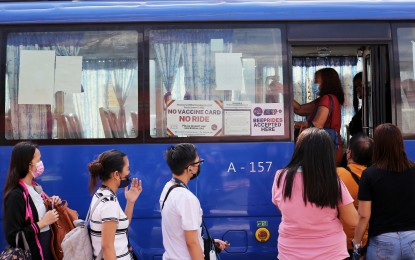
CASHLESS PAYMENT. Passengers queue to tap their 'Beep' card to pay their fares before taking a seat on a modern jeepney along Commonwealth Avenue, Philcoa in Quezon City on Jan. 31, 2022. The Department of Transportation on Tuesday (Oct. 11) announced its intention to expand the existing automated fare collection system (AFCS) in modern jeepneys, buses, and rail lines to enable other methods of cashless payments such us using bank cards and mobile devices. (PNA photo by Joey O. Razon)
MANILA – The Department of Transportation (DOTr) is looking to expand cashless payment in public transportation through other payment methods such as bank cards and mobile phones to further improve the country’s public transportation backbone.
In a media bulletin on Tuesday, the DOTr said these payment methods include the use of quick response (QR) codes for mobile wallet applications, credit and debit cards, and near-field communications (NFC) technology in mobile devices such as smartwatches.
These payment methods, it said, may be used in buses, rail lines, and modern jeepneys.
“The use of the AFCS technology in the mass transit system expands the fare media the public can use, while offering a secure payment system, improved passenger convenience, and helps lessen card-issue and management costs for transit operators,” it said.
New methods of payment, it said, would expand the DOTr’s current efforts on using an automatic fare collection system (AFCS) public transport through its partnership with Landbank of the Philippines (Landbank) and the use of their Europay-Mastercard-Visa (EMV)-enabled bank cards in modern jeepneys.
The pilot production testing of the project was launched on Sept. 1 at the Parañaque Integrated Terminal Exchange (PITX).
The project, it said, aims to verify the entire AFCS under “real-time operating conditions” as well as its compatibility with the country's mass transit system.
It would also establish end-to-end AFCS processing and help slowly familiarize the public with using EMV-compliant bank cards to pay their fares. (PNA)
